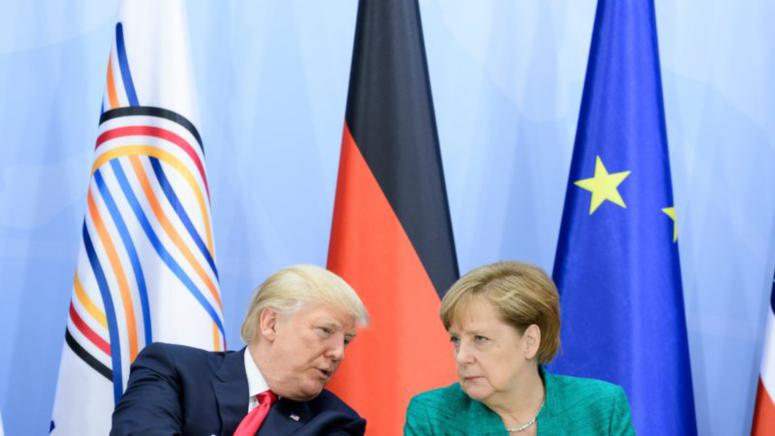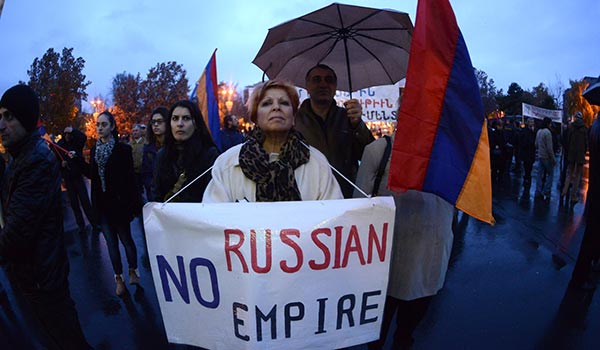
EurActiv (2 August 2017)
Washington’s decision to impose more sanctions on Moscow has been criticised by EU member states, particularly Germany. EURACTIV’s partner Der Tagesspiegel reports.
This week, Vladimir Putin reacted to US sanctions by announcing that 755 American diplomats and embassy staff will have to leave Russia.
The sanctions, which are targeted, among others, at Russian gas giant Gazprom, could give the US an advantage in providing Europe’s energy supply and are a tit-for-tat response to Russia’s alleged interference in last year’s presidential election.
Germany’s government, particularly its social democratic members, has been critical of the decision. Minister of Economic Affairs Brigitte Zypries (SPD) even described the sanctions as a violation of international law.
No end in sight to Ukraine fighting as Normandy format stumbles
The phone call lasted two hours. Emmanuel Macron, Angela Merkel, Petro Poroshenko and Vladimir Putin on Monday (24 July) tackled the question of how to end the fighting in eastern Ukraine, with little success. EURACTIV’s partner Der Tagesspiegel reports.
That is because the US penalties could also affect German companies that are involved in the construction of Russian energy projects like the Nord Stream 2 pipeline.
The sanctions are considered to be part of a domestic political struggle between President Donald Trump and Congress. The latter wants to tie Trump’s hands in terms of Russia policy.
Chief among the motivations for the sanctions are the alleged interference in the election and Russia’s involvement in the Ukraine crisis. Congress wants to make sure the president cannot alleviate or abolish the sanctions against Moscow.
Germany’s fears that the sanctions could affect European companies involved with Russia have barely registered in the US media’s coverage. Neither has the prospect of countermeasures by member state governments and the European Commission.
Only readers of specialised news outlets like Bloomberg have any idea that Washington’s machinations could exert a significant toll on international relations.
Eight European projects to be hit by US sanctions on energy sector
Eight projects involving European companies could be affected by US sanctions if Congress passes a bill on Tuesday (25 July) to hit firms working with Russia in the energy sector.
German Foreign Minister Sigmar Gabriel’s (SPD) warning that the US wants to disrupt Russia’s gas exports to Europe in order to take advantage of the market have not been given much attention on the other side of the Atlantic.
The US has not yet imposed further penalties after President Vladimir Putin decided to expel its 755 diplomatic staff. Moscow chose this retaliatory route instead of economic sanctions because Russia is still heavily dependent on Western investment and know-how.
European companies are concerned about the sanctions because they include “extraterritorial effects”. This means that if punitive measures are imposed on Nord Stream 2, then every material supplier, service provider and construction company involved will be sanctioned.
Sigmar Gabriel has already insisted that Berlin will not accept any penalties that are levied against German companies.
Angela Merkel’s CDU foreign policy chief, Norbert Röttigen, claimed that Gabriel and Zypries’ harsh words for the US sanctions are politically motivated ahead of September’s federal elections. He added that the dispute needs “transatlantic cooperation and dialogue”, not threats.
Röttigen also differs with the SPD on Nord Stream 2, which he has labelled as “incompatible with EU energy targets”. The Social Democrats have also been accused of being influenced by their former leader, ex-Chancellor Gerhard Schröder, who sits on the board of the project.
Estonia urges caution on Nord Stream 2 pipeline
Estonia’s foreign minister has warned against letting the controversial Nord Stream 2 project, a planned pipeline between Russia and Germany, become a “tool for political pressure”. EURACTIV’s partner Der Tagesspiegel reports.
The planned pipeline draws together energy suppliers in Germany, Austria, France, the United Kingdom and the Netherlands. French firm Engie are invested in the project, along with its counterparts in other member states, to the tune of €9.5bn.
Engie has warned that it will withdraw from the project if the penalties are indeed applied but is currently pursuing a wait-and-see attitude.
The European Commission is also biding its time. A spokesperson for the executive told Der Tagesspiegel that the institution is pleased to note that any sanctions will be discussed with the US’ allies before they are applied.
Brussels was also happy to note that US lawmakers amended the original version of the sanctioning act so that penalties will only apply if Russia holds at least a 33% share in projects.
Juncker flexes muscles over US sanctions
European Commission President Jean-Claude Juncker insisted on Wednesday (26 July) that the EU is ready to retaliate “within days” if European companies are impacted by a US Congress decision to pass a bill that will punish firms that work with Russia on energy projects.
No comments yet.
- BRITAIN'S PRINCE PHILIP MAKES FINAL PUBLIC APPEARANCE Europe - EU 02.08.2017
- ARMAN NAVASARDYAN: US-RF CONTRADICTIONS CHALLENGE ARMENIAN DIPLOMACY The Caucasus and Turkish-Armenian Relations 02.08.2017
-
 RUSSIA WILL TRY TO ELIMINATE THE ARMENIAN FACTOR
The Caucasus and Turkish-Armenian Relations
02.08.2017
RUSSIA WILL TRY TO ELIMINATE THE ARMENIAN FACTOR
The Caucasus and Turkish-Armenian Relations
02.08.2017
- ISRAELI MINISTER IN ARMENIA: DAMAGE CONTROL OR SOMETHING MORE? The Caucasus and Turkish-Armenian Relations 02.08.2017
- IRAQ IN FRESH OFFENSIVE TO HUNT DOWN DAESH TERRORISTS Iraq 02.08.2017
-
25.01.2016
THE ARMENIAN QUESTION - BASIC KNOWLEDGE AND DOCUMENTATION -
12.06.2024
THE TRUTH WILL OUT -
27.03.2023
RADİKAL ERMENİ UNSURLARCA GERÇEKLEŞTİRİLEN MEZALİMLER VE VANDALİZM -
17.03.2023
PATRIOTISM PERVERTED -
23.02.2023
MEN ARE LIKE THAT -
03.02.2023
BAKÜ-TİFLİS-CEYHAN BORU HATTININ YAŞANAN TARİHİ -
16.12.2022
INTERNATIONAL SCHOLARS ON THE EVENTS OF 1915 -
07.12.2022
FAKE PHOTOS AND THE ARMENIAN PROPAGANDA -
07.12.2022
ERMENİ PROPAGANDASI VE SAHTE RESİMLER -
01.01.2022
A Letter From Japan - Strategically Mum: The Silence of the Armenians -
01.01.2022
Japonya'dan Bir Mektup - Stratejik Suskunluk: Ermenilerin Sessizliği -
03.06.2020
Anastas Mikoyan: Confessions of an Armenian Bolshevik -
08.04.2020
Sovyet Sonrası Ukrayna’da Devlet, Toplum ve Siyaset - Değişen Dinamikler, Dönüşen Kimlikler -
12.06.2018
Ermeni Sorunuyla İlgili İngiliz Belgeleri (1912-1923) - British Documents on Armenian Question (1912-1923) -
02.12.2016
Turkish-Russian Academics: A Historical Study on the Caucasus -
01.07.2016
Gürcistan'daki Müslüman Topluluklar: Azınlık Hakları, Kimlik, Siyaset -
10.03.2016
Armenian Diaspora: Diaspora, State and the Imagination of the Republic of Armenia -
24.01.2016
ERMENİ SORUNU - TEMEL BİLGİ VE BELGELER (2. BASKI)
-
AVİM Conference Hall 24.01.2023
CONFERENCE TITLED “HUNGARY’S PERSPECTIVES ON THE TURKIC WORLD"









